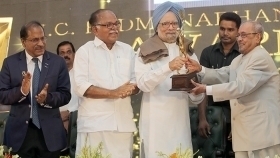Dr. Manmohan Singh - Architect of India's rebirth
August 09, 2018 | posted in News | posted by : Manappuram Finance
We all know Dr. Manmohan Singh as the architect of India’s landmark economic reforms of 1991. He is an economist of international repute who came into politics and went on to scale the highest rungs of government. He took charge as Finance Minister in 1991 under Prime Minister Shri P.V. Narashimha Rao, at a time when the Indian economy was on the brink of collapse. The country was heading towards bankruptcy when Dr. Singh pressed ahead with radical reforms that would go on to reshape India’s destiny. Industrial output took off, jobs were created, and millions were pulled out of poverty. When we look back at what has been achieved since then, there is no doubt that the moment when Dr. Singh rose to deliver an impassioned speech to present the budget of 1991 is the moment that marks India’s rebirth.
History will record India’s year of birth as 1947 but for millions of Indians, the true meaning of freedom could be realised only after 1991 when our masses could be freed from poverty and disease in greater measure than ever before. Many more could now look forward with hope for a better life for themselves and for their children.
The bold reforms of 1991 were conceived by Dr Singh who went to the Prime Minister with the message that India needed difficult reforms to move forward. To the credit of the then Prime Minister, he supported Dr. Singh to the hilt. Thus began a difficult restructuring of the Indian economy when it was opened up to competition with a larger role for the private sector, and a diminished role for the government.
The new industrial policy ended public sector monopoly in many sectors and opened the doors for foreign direct investment. The overvalued rupee was depreciated in two phases which gave a nudge to exports. Trade policy was liberalised by replacing quantitative restrictions with tariffs which were gradually lowered to open up the economy to competition. In 1990-91, the weighted average import tariff was 125 percent which was brought down to 71 percent within two years. With the support from International Monetary Fund (IMF), Dr Singh implemented major macroeconomic adjustments, a mix of monetary, fiscal and exchange rate policies meant to reduce internal and external imbalances. The government’s finances were brought under control and the unlimited monetisation of the fiscal deficit was ended. Economic conditions became conducive for entrepreneurship to flourish even as the government increased corporate tax from 40 to 45 percent to ensure funds to fulfil its social commitments.
The results became apparent within a few years. Trade registered significant growth over pre-liberalisation period. The ratio of exports of goods and services to GDP doubled to 14 percent in 2000 from 7.3 in 1990. In the same period, the ratio of total goods and services trade to GDP increased from 17.2 percent to 30.6 percent.
The economic reforms of 1991 provided a strong foundation for the economy to grow at a faster pace than ever before. In recent years, India has emerged as one of the fastest growing leading economies of the world. It has become possible only because of those far reaching reforms helmed by Dr. Singh while holding the position of Finance Minister.
Today, I believe India owes a debt of gratitude to Dr. Singh which can never be truly redeemed.
And this award to Dr. Manmohan Singh is only a humble gesture of recognition of a man who has made a lasting difference to our lives. We consider ourselves truly fortunate that the first recipient of the V.C. Padmanabhan Memorial Award for Lifetime Achievement is also one of India’s tallest sons.
(V.P. Nandakumar is MD & CEO of Manappuram Finance Ltd.)


